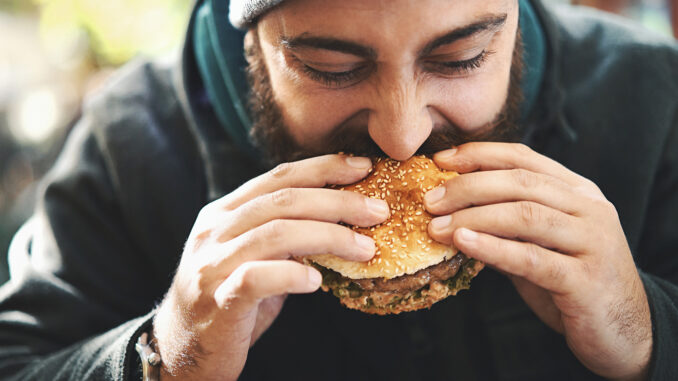Our emotional needs are reflected in our daily activities: the hobbies we choose to fill our free time with, the people we seek companionship from, and last but not least, what and how much we choose to eat. Each of us has experienced at least one episode of emotional hunger or comfort food. When faced with overwhelming situations, we tend to choose compulsive eating as a refuge in which to calm our emotions. Emotional eating can also reflect emotional deprivation. Moreover, emotional hunger may be a response to a conflict with oneself. To summarise, emotional hunger is a reaction to repressed emotions, unfulfilled desires, trauma or frustration. Paradoxically, but after compulsive eating we feel more guilty instead of calming down. This happens because we choose high-calorie, nutritionally poor food in the wake of emotions. How many of us choose a bowl of salad when we are sad or disappointed? Remember that scene in the movies. A person is dumped and takes refuge in front of the TV with the biggest box of candy possible.
Amidst stressful situations we choose to extract serotonin from sweets, pizza, chips, crisps and everything sugar, carbs and fat. Binge eating is considered a form of atypical depression. It is not clinical depression, but rather high tension that the person chooses to control with feel-good foods. Unfortunately, if this eating habit becomes habitual, then you can face weight gain and severe health problems. So instead of filling our emotional voids, we worsen our psyche, as guilt and worry about our figure kicks in as soon as we finish the last chocolate in the house.
How to curb your unhealthy food cravings without a nutritionist?
Food cravings can be curbed or satisfied with healthier food alternatives. However, it’s better to treat the cause than the effect. Analyse your recent problems and identify stressors.
- Remember that dopamine isn’t just food
Be creative and look for different sources of happiness. Did you get a high grade on your exam or are you just in great spirits? Rather than marking happy events by serving sweet meals you could stimulate yourself in other ways. Try Shiatsu massage to calm your body and mind. For example, Fujiiryoki Japanese massage chairs and armchairs are designed with customised programmes and over 80 massage techniques for the neck, shoulders, back, thighs and buttocks. The technology associated with therapeutic massage chairs stimulates blood flow, normalises blood pressure, regulates pulse, detoxifies the blood and reduces cortisol levels.
- Identifying the cause is 50% of the solution
It may be a difficult time at work, relationship problems, financial stress, etc. Sometimes you’re overwhelmed by fleeting problems, other times, compulsive eating may be a refuge from older traumas. If you have experienced tragic or unbalancing events, you may want to seek the advice of a therapist. If you feel that stress is a response to recent situations (a break-up, financial problems, job loss), then start to form a healthy life routine.
If you’re not sure what’s driving you to make harmful choices, then keep an emotion journal. Use a dated diary, divide each page into three sections and write down the following: time, fleeting problems and associated emotion. Keep the notebook permanently and write down everything you feel at the time you crave unhealthy foods. Before long you will be able to identify the predominant emotions that generate the excess appetite.

Source: atriumhealth.org
- Extract dopamine from healthy sources
Foods high in carbohydrates boost levels of dopamine, a hormone associated with well-being. That’s why you almost unconsciously choose to reduce stress by eating these foods. Fortunately, chocolate or fast food are not the only sources of dopamine. Make up ‘happy snacks’ with foods such as blueberries, nuts, hazelnuts, almonds, cherries, dates or dark chocolate with at least 75% cocoa.
- Don’t give up small pleasures
Dieting is not just about healthy meals but about balanced choices. When you deprive yourself of sweet snacks or fast food you risk feeling frustrated, which does more harm than good. The key is planning ahead. Plan to eat crisps only when you’re watching films and stick to what you set out to eat.
- Put your emotions in motion
Physical activity is crucial to the emotional cleansing process. If compulsive eating takes place against a backdrop of stress, then look for remedies to relieve this factor. If you’re not into sports, then stick to light aerobics, yoga, stretching massage, jogging, nature walks or dancing. No matter which option you choose, your mental health will only benefit.
Giving up harmful eating habits is a long process that requires patience, self-discipline and sometimes outside support. You can ask a therapist or nutritionist for help to better understand the connection between your emotions and your daily food choices.







